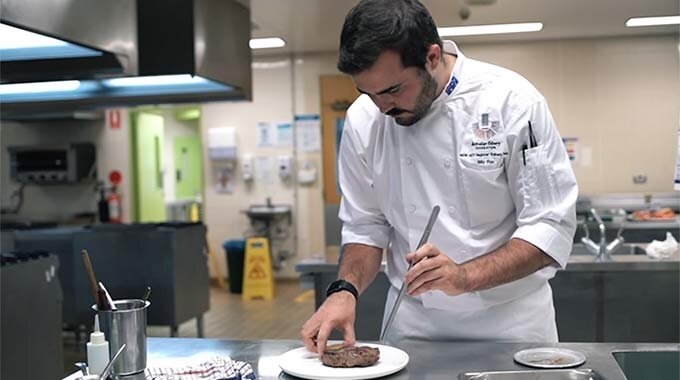PART 2: Tomorrow’s chefs – making the industry more appealing for young people
On the shortage of chefs, Karen Doyle says: “I don’t know whether it’s a sign of the times. I do think we need to change the image of a chef and the working conditions to make it more attractive. When I was an apprentice we were very lucky in that you were guaranteed every second weekend off within your team, and that was to encourage you to stay in the industry. You could plan with your friends, you could have a social life, you weren’t cut off all the time.
Karen Doyle (RIGHT) WITH YOUNG AWARD WINNING CHEFS
“We’re now seeing more hospitality businesses moving to a four day week to give three days off to those young persons, because it is challenging for them to go to TAFE or college one day a week and then work four or five days straight – that’s not a lot of time off. There’s also lots of apprentice subsidies coming out at the moment to encourage more employers to take on apprentices and encourage them to look after them. We were worried whether it would be taken advantage of, but it seems to be working very well – it’s taking a bit of pressure off a business owner who possibly couldn’t afford previously to have two apprentices but now can.
“I also think the changing emphasis in education are giving young chefs the knowledge and confidence that if they are treated badly they should seek other employment, whereas 20 years ago you wouldn’t have done that ”
“You would have done 18 hours a day, seven days a week because it was a five star hotel and you wanted the skills. Today working conditions are changing and employers are more aware that you have to look after your staff. If you want that product to be good at the end of the day, you need to nurture your staff member to ensure they’re coming in and giving 100 per cent and doing everything by the book. If you motivate someone they’ll shine.”
Billy Fox - Youth chef ambassador WACS
A good mentor can unlock doors
“There are young chefs who come in to workplaces that are probably not the most supportive environments,” Billy Fox points out, “and I’ve seen it happen time and time again that it’s detrimental to their career. They might be very passionate and hands on when they start out, but they’re not put into a position where they’re supported. Sometimes apprentices are looked at as cheap labour, but they’re cheap because you’re supposed to be training them – it’s supposed to go both ways.”
It’s for this reason, he says, that good mentors are so important. “It might be a previous employer or a trainer, but equally it may be someone you haven’t even worked with directly. There’s a lot of great mentors in the ACF who are willing to give their time. They’re definitely out there - all you have to do is ask.”
Glenn Flood says awareness of the value of mentoring has grown in recent years. “Thanks to the ACF and professional competitions, there’s always the right calibre of individuals around - guys who have track records in the industry, who’ve cooked in Culinary Olympics around the world, who have made themselves available and accessible to young people, who’ve got the experience. And the beautiful thing about that is there’s only one way to get it, you have to live it - so there’s that test, trial, fail, learn again and again over 30 years or so.
“If you can take that experience on board as young person, you’re already leagues in front, rather than having to go through it yourself. And also a good mentor can unlock doors”
Glenn Flood - Culinary Leadership Expert
Peter Wright describes good mentoring as akin to a buddy system – “There’s a head chef and sous chef, or a chef and a cook, and they become buddies and help each other – it’s imparting skills. This ties into the mental health side of things too. When I look back at my time coming up, you were tough and hard and had to put up with stuff, now it’s a lot easier to express yourself, but having someone you can talk to always helps you make decisions. The biggest decisions you make are in the smallest conversations. ‘I’m going to quit’ or ‘I’ll take the job’ is a very small conversation but it has career defining implications. So to be able to talk to someone before you do something decisive is always a good thing.
“I have mentors myself that I’m always talking things through with, and I think everyone should find someone they can trust, or more than one person because there’s different aspects you want to talk about with different people.”
“And the whole ‘chefs are tough, it’s a tough business’ thing goes back to when we would be scared to ask the chef ‘can we have Saturday off?’ because Saturday was always the busiest day of the week. Now someone will come to me and say ‘I need to leave early tomorrow’ and whereas years ago I would have gone ‘You’ve got to be kidding me’ now I say OK, because they have a family concern or a personal issue and you have to accept that.
“So we’ve gone away from that hardline approach, because the younger generation won’t put up with people being dogmatic. It’s a lot freer today and more encompassing of people’s expectations and the awareness that they do have lives outside the kitchen. Some restaurants are closing two days a week so everyone only works five days - businesses are adapting so they can keep staff and give them a life outside the kitchen. And also people need to unwind, relax, watch a bit of Netflix, ride a bike, fish, whatever they have to do to chill so they can come back and do another week of hard slog.
Finding a work-life balance
“People are much more aware of burn-out and mental health and the importance of keeping in a positive frame of mind. In my team I’m always looking out for people acting a bit differently, and once you have grownup kids you learn to look for signals of something being not quite right. Then you ask yourself, how can I fix this - there might be something I can do to help. Sometimes asking are you OK can make a big difference.”
“It’s about trying to find that balance, not burning out, maintaining the physical and mental health side of things to get longevity in the workplace. The last thing a head chef wants to do is grind your team up and burn them out because you’re investing countless hours in these individuals. In the businesses I work with, culture is absolutely king and it is usually led from the top down”
“If your executive chef hasn’t been trained in particular leadership skills, they can only pass on what they know, and they mightn’t be delivering them in the right way. It’s a truism that you don’t know what you don’t know, and it can be difficult to fill that gap and that can come across as bullying or aggressive, short and sharp behaviour but let’s be honest - in a kitchen seconds can count when you’re dealing with customer product. When it comes to the difference between a good steak and an overcooked steak, we could be talking three to five seconds, so that’s one reason for the pressure in that environment.”
Karen Doyle acknowledges: “It’s important to set your rules in the kitchen. I’ve always done that - I’ve set my rules during service: this is my expectation, this is what might occur, there might be raised voices but at the end of service we debrief and we move on. A debrief is very important. That little kid at the back who’s been washing lettuce all day needs to be given praise – it’s about building up each individual and acknowledging their contribution to the team. Sometimes the wrong assumptions are made, for example that a young chef won’t care if you ask them to stay back, but actually they do even if they don’t say.
“We have to remember that if we don’t look after these young chefs and train them correctly, motivate them and give them aspirations for their future careers, we’re not going to thrive as an industry. To a great extent it’s about camaraderie - one young chef I knew from 10 years ago rang me about someone they were worried about and I couldn’t get hold of them, so I rang someone else who knew them. It’s about looking after one another, that sense of family.”
PETER WRIGHT - Global Hospitality group
Kindling the spark for a hospitality career
“There are certain detrimental factors to a career in hospitality,” Peter Wright says, “such as having to work unsociable hours, and they’re not going away. To choose it as a career in that respect means it’s got to attract you in a certain way. Is it the money? Probably not. It’s the passion – there’s got to be a little spark in you. You were planning to do a uni course but you’ve been working in a kitchen somewhere and suddenly you decide this is fantastic, and that spark has been kindled.”
As a younger chef, Billy Fox acknowledges the difficulty in finding staff of his generation willing to work in hospitality. “I struggle to employ people in my own age group because they don’t want to work in this industry – and I have to admit when I put myself in my shoes I can see their point. They finish school, go out and get themselves an apprenticeship and if they’re lucky they’ll be working 40 hours a week at $14 an hour, while their old school friends are making twice as much. So what’s the incentive for them to stay in the job?
“I struggle to employ people in my own age group because they don’t want to work in this industry – and I have to admit when I put myself in my shoes I can see their point.”
“You always hear the older generation of chefs go, ‘they need the passion’ and that’s fantastic, but the passion doesn’t pay the bills or the mortgage. And while I love this industry - the things I’ve done through it are insane - I can see the other side. Forty odd years ago you finished school, got your apprenticeship and your kitchen staff became your family and you all hung out together. I’m not saying that doesn’t still happen, it does - I did it last night - but these young people have their phones and social media and they have that group of friends from high school who are constantly asking them to participate in social life.
“Whenever you go to foodservice symposiums or industry events, they’re constantly talking about how they can’t get young people into the industry. They’ve been asking the same question for 30 years but I don’t think they address the crux of the problem. This industry has always found staff through ‘if you love food, come and work for passion’ and that’s fantastic, but everything’s getting more expensive and passion isn’t a going currency.”









